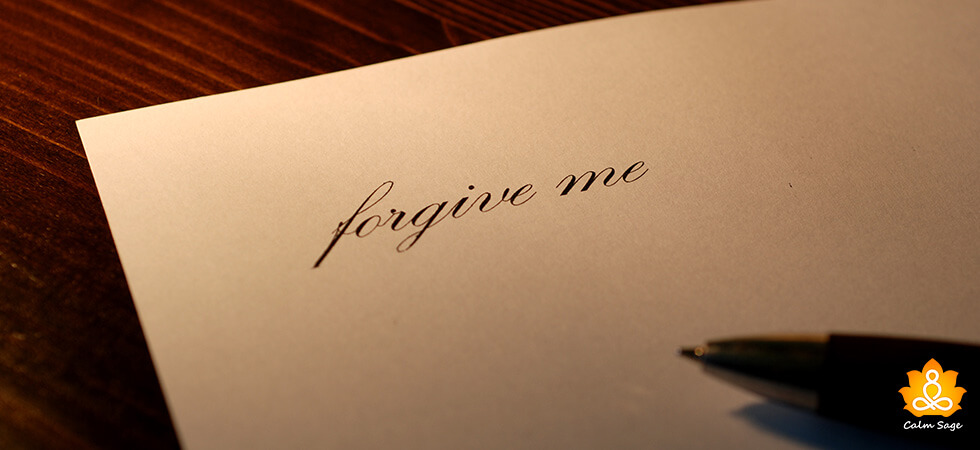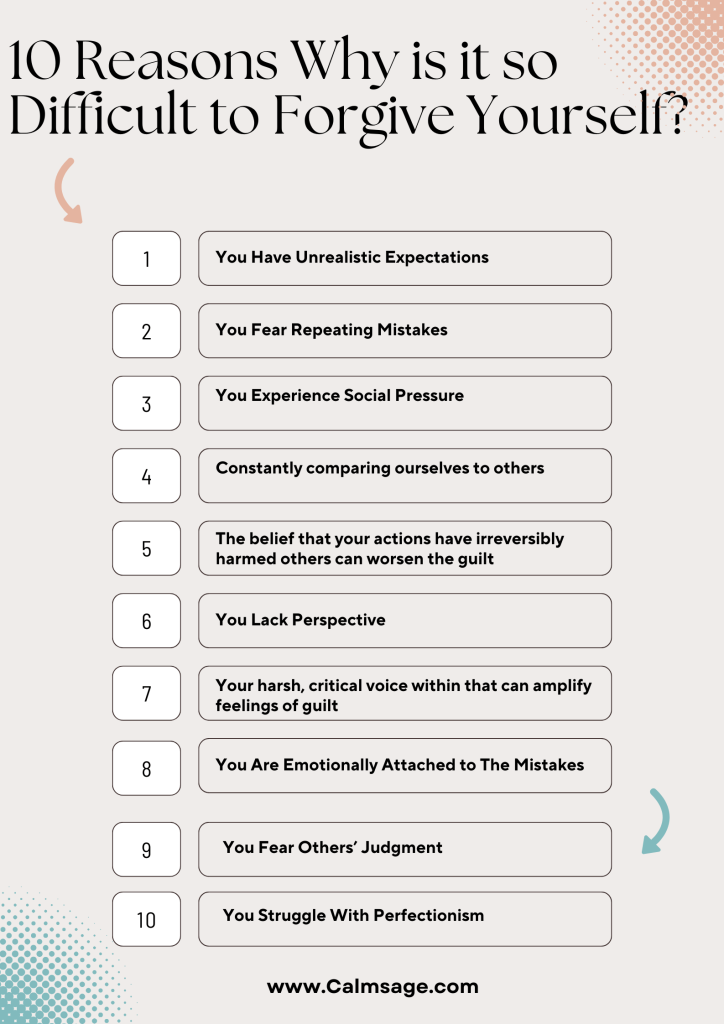10 Reasons Why It Is So Difficult to Forgive Yourself (And How To)

We’ve all been there — stuck in the marsh of regret, struggling with mistakes of the past that still haunt our waking thoughts and steps. Forgiving others might even be easier in some ways, but when it comes to self-forgiveness, it’s an uphill battle that seems to never end.
Holding others accountable for a mistake makes some kind of sense. After all, we don’t want to lose our moral ground. But what if the mistake is yours? What if the grudge you have is against you? What if you’re the one who needs forgiveness?
In this article, let’s find the answers to these questions by answering just the one; Why is it so difficult to forgive yourself? Read on to know the reasons why you can’t self-forgive, why it is important, and how you can forgive yourself for your mistakes.
The Importance of Self-Forgiveness
Before I take you to the reasons self-forgiveness is difficult, let’s acknowledge why self-forgiveness matters. Self-forgiveness is the key to finding that peace within. When you learn to forgive yourself, you apply a balm to your soul, allowing yourself to release the weight of your past mistakes, steady future growth, and pave the way for a lighter and happier future.
Holding onto regrets, grudges, and self-blame can add to the baggage of your mental and emotional well-being. I did that. I harbored self-blame and regret towards a former friend of mine for years, and it turned out to be a bigger mistake. When I began to let go of that hurt and forgave her, it was easy, but when it came to me and my mistakes, I found it difficult to let go.
It turned out that holding all that anger and hurt inside was adding to my resentment and making it infinitely difficult for me to enjoy my life and let go of my pain. Eventually, it hindered my growth as a person.
But once I began my journey of self-forgiveness, I realized that not only did I feel free of resentment, but I also began to love myself anew. Self-forgiveness isn’t just an act of healing, it’s an act of self-love too; a chance to move forward in life and embrace the experiences as lessons they are meant to be.
Why is it so Difficult to Forgive Yourself?
Coming to the reasons why it is so difficult to forgive yourself, here are some that you may find relatable;
1. You Have Unrealistic Expectations
We often set impossibly high standards for ourselves, making it tough to accept when we fall short. This high expectation we set for ourselves can be our shortcomings when it comes to self-forgiveness. So, learn to let go of your high and unrealistic self-expectations.
2. You Fear Repeating Mistakes
You might also have a fear of making the same mistakes again. This fear of making the same mistakes once more can paralyze you, creating a barrier to forgiving yourself. You need to understand the cause of your fear and address it, or maybe seek help from a counselor or a loved one in helping you let go of your fear.
3. You Experience Social Pressure
Societal pressures and cultural norms can instill a sense of guilt and shame, making self-forgiveness a daunting task. In many cultures, there are expectations regarding actions, success, and even responsibility. These norms change how we accept blame. When we fall short of these expectations, we can all internalize a sense of guilt and shame.
4. You Compare Yourself to Others
Constantly comparing ourselves to others can lead to feelings of inadequacy, worsening the struggle to forgive our own shortcomings. To stop this and forgive yourself, you need to stop comparing your experiences with others.
Also Read: How To Stop Comparing Yourself With Others?
5. Your Belief in Your Actions
The belief that your actions have irreversibly harmed others can worsen the guilt and shame you feel, making self-forgiveness seem impossible. To self-forgive, you need to let go of these perceived notions about your belief in your actions and how they might or might not have affected others.
6. You Lack Perspective
In the heat of self-blame and self-condemnation, it’s easier to lose sight of the bigger picture and forget that everyone makes mistakes. You need to accept that you are a human and so are bound to make mistakes. It’s about changing perspectives before you forgive yourself.
7. You Self-Criticize
The hardest part of self-forgiveness is the harsh, critical voice within that can amplify feelings of guilt, creating a toxic cycle that delays self-forgiveness. Learn to change the tone of your inner voice. You can do this by practicing positive self-talk and learning to accept your part in your mistakes.
8. You Are Emotionally Attached to The Mistakes
Yes, that’s possible too. Emotional ties and attachment to past mistakes can make it difficult to forgive yourself, as it makes it harder for you to separate yourself — as in, your identity — from the mistake you’ve made or experienced. This attachment to past actions can make it difficult to self-forgive.
Also Read: ‘Why Do I Feel So Guilty All The Time?’ It Could Be Your Guilt Complex Talking!
9. You Fear Others’ Judgment
The imagined judgment of others can contribute to self-blame, making it harder to extend compassion to yourself. If it is something you are going through — the fear of having others judge you, then addressing the fear with the help of a professional can be a recommended course of action.
10. You Struggle With Perfectionism
The relentless pursuit of perfection can lead to a cycle of self-blame and self-hatred when expectations are not met. Letting go of perfectionism can help you take one step closer to letting go of self-hatred and forgiving yourself.

How to Practice Self-Forgiveness?
1. Be Self-Compassionate: Treat yourself with the same kindness you would offer a friend facing a similar situation.
2. Seek Support: Share your feelings with trusted friends, family, or a therapist who can offer perspective and encouragement.
3. Practice Mindfulness and Meditation: Try mindfulness to stay present and cultivate a non-judgmental awareness of your thoughts and actions.
4. Set Realistic Expectations: Accept that you’re human and set achievable goals, understanding that perfection is an unattainable standard.
5. Write a Forgiveness Letter: Address yourself in writing, expressing understanding and compassion toward yourself.
6. Celebrate Small Wins: Celebrate the steps you take toward self-forgiveness, no matter how small.
Also Read: The Psychology Of Small Wins: Why (And How) You Should Celebrate Small Wins
Wrapping Up…
Self-forgiveness is a practice that requires patience, compassion, and a willingness to embrace imperfection. By understanding the reasons, you find it difficult to forgive yourself and incorporating practical steps for self-forgiveness, you can break free from the chains of self-blame and start on a path of healing.
Remember, you deserve the same forgiveness you readily offer to others. Be kind to yourself and watch as the weight of past mistakes lifts, making room for a brighter, happier future.
I hope this article helped you understand why it is so difficult to forgive yourself. Let me know your thoughts and comments in the section below.
Take Care!




















